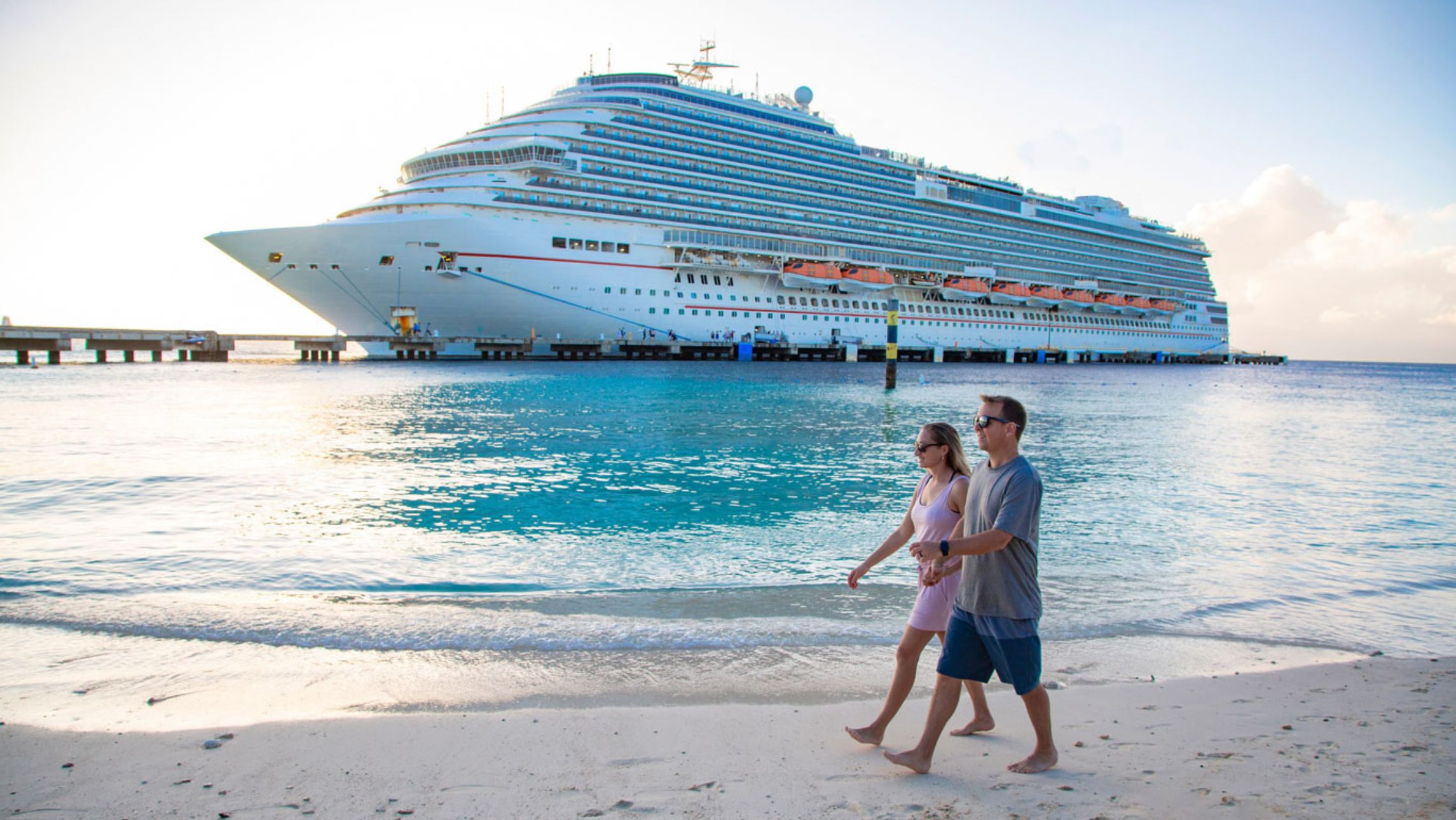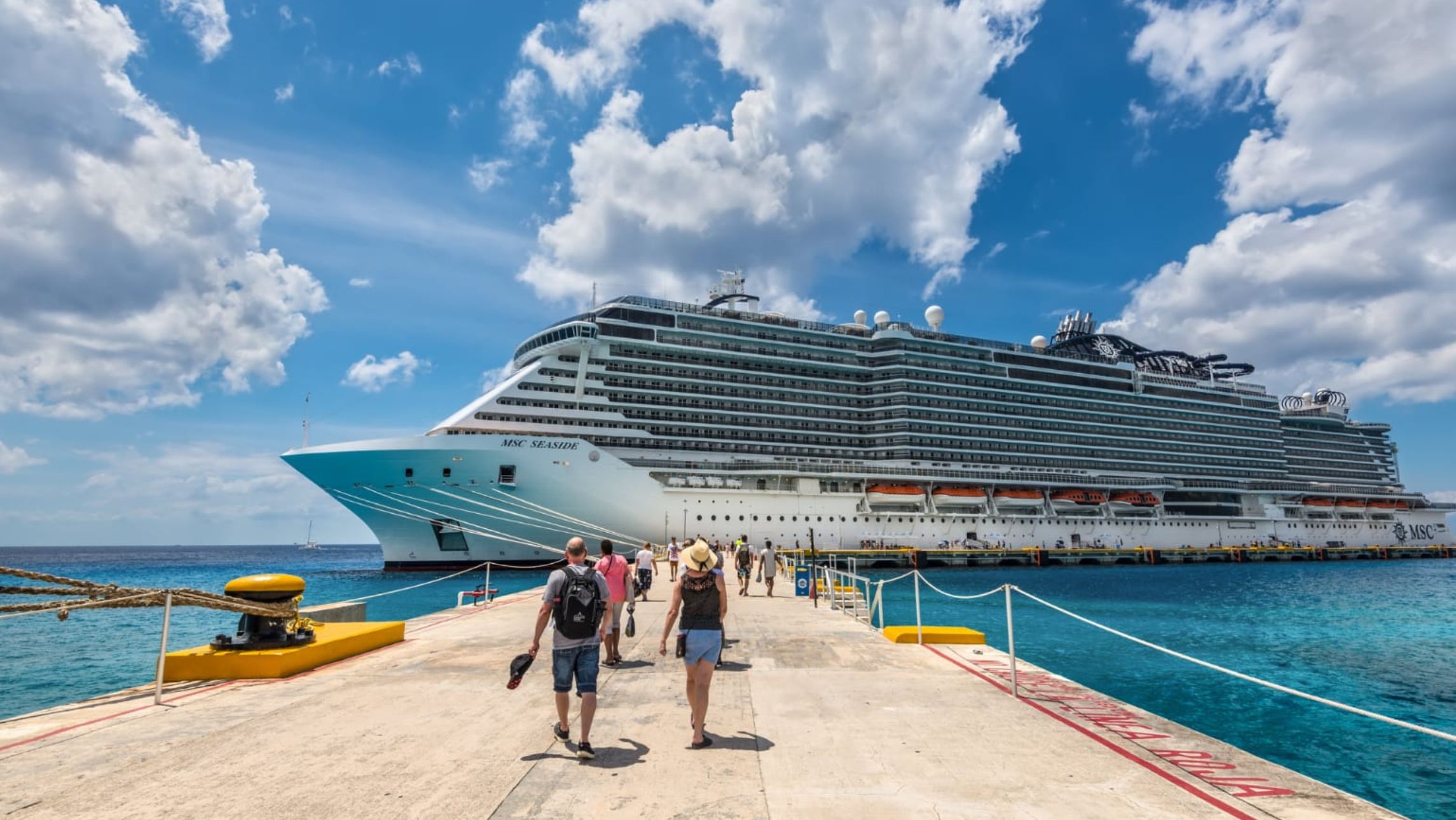Australians may be able to fly overseas and even cruise. And multi-national travel insurance brands do sell policies for multi-night cruises…but not for COVID.
Apparently no Australian insurance company can compute the risks – especially since the government has yet to present its plan for the return of cruise.
Cover-More actually covers…er…less. But charges more.
We asked about cruise insurance, and here’s what the company’s PR agency sent us:
“Cover-More Travel Insurance has mandatory Cruise Cover if you are travelling on a multi‑night cruise. If you are going on a cruise, we ask that you please tell us. To be covered for cruise travel an additional premium applies and we can provide a quote. If cruise cover is added it will be shown on your Certificate of Insurance.
We define a multi-night cruise as a trip involving an ocean, river or sea voyage of more than two nights in total duration, where transportation and accommodation is primarily on an ocean, river or sea going passenger ship.
Multi-night cruises include voyages:
- that don’t stop at any port along the way e.g. a cruise out to sea for three nights and back
- on a vessel to various ports e.g. sailing in Croatia, a river cruise in Europe; and
- those on a cruise ship around the same country e.g. Australia: Sydney-Hobart (select “Domestic Cruise” as the destination) or USA: Hawaiian Island cruises.
For any of these, an International Plan with Cruise Cover is required.
For a multi-night cruise within Australia, in the Kimberley region or on the Murray River for example, a Comprehensive Domestic Plan may be purchased and no Cruise cover is required.
Cover-More also introduced COVID-19-ready benefits on 9 December 2020 for Australians travelling domestically, and to New Zealand. These COVID-19 benefits will also offer previously-unavailable protection for overseas travel to other countries as official ‘travel bubbles’ are agreed and announced by the Australian Government.
However, if someone contracts COVID-19 on a multi-night cruise, this will not be covered by Cover-More Travel Insurance. There are some pre-trip cancellation and amendment benefits for cruise travellers and these are contained in the attached extract from our PDS on www.covermore.com.au
Communications manager Maureen Mullins told The Australian Financial Review: “The historical examples of cruise ships is, if you’ve got passengers who can’t get off and must get medevacked, that can get expensive. We can’t afford the risk at the moment to give a realistic premium to a cruise passenger.”
It was also revealed that Cover-More expects travel insurance to increase nearly 10% in price, adding to the complications of cruisers who are hoping to skip town and cruise overseas.
One of the largest costs that may not be covered by a lot of insurers is PCR tests, which while often compulsory tests are covered by cruise lines, are also a requirement for getting into most countries across the world at the moment.
Cover-more also shared that a trip cancelled due to borders closures would not be covered under their insurance, as it is too difficult for insurers to predict when a border could close and what cost this is to the insuree.
As some of the pieces of cruise and travel come back together, insurance remains a difficult part of the puzzle.
Cruise Passenger spoke to some experts for guidance on how to go about purchasing cruise insurance in a COVID world.
What will be covered?
Warren Duke, travel insurance expert at Compare the Market warns that most policies will no longer automatically include cruise cover.
“A lot of travel insurance policies don’t cover cruising automatically, customers need to make sure they buy the add on which includes the cruise benefits.
“Various insurers have now introduced limited pandemic cover, customers can now buy a policy that will cover them and their medical expenses if they do contract COVID-19, while they’re travelling to the cruise or on the cruise, the policy will respond and give them cover for any medical expenses they incur.
“It will also cover any cancellations and refunds that aren’t covered by the cruise line itself. However, not all policies have that limited COVID-19 cover so customers should look for policies that do.”
However, Mr Duke says if you are affected by border closures or cancellations, you may need to turn from your insurance provider to your cruise line.
“The one thing that the insurers are unable to price for or offer as part of their policy is any change to the itinerary, if the ship can’t stop at a port because of COVID-19 or the ship decides not to sail because there are local cases preventing access to the ship or preventing the ship from being fully supplied, they will not be covered.
“If there’s a border closure that’s stopping the boats from leaving the port, those expenses will not be covered by the travel insurance policy. However, cruise lines are normally pretty good in refunding those customers or giving them travel credits or working with them to get them on another ship at another point in time.”
Is cruise insurance available and will it cover for COVID?
For those who are looking to cruise overseas before domestic cruising returns, Jessica Prasida, Insurance Expert at Finder cautions that most travel insurers aren’t yet offering cruise insurance.
“At this stage present most of the major travel insurance companies haven’t enabled cruise cover just yet, which makes it difficult to say what changes we may see.
“Obviously you’d expect that when they do, the normal things such as missed port departure will still be covered, as would contracting COVID while you’re on your cruise.”
However, taking the example of Cover-More, while they do currently offer multi-night cruise insurance, making it a mandatory premium for those purchasing travel insurance and cruising as part of their holiday, they do not cover if someone gets COVID on board.
“Cover-More Travel Insurance has mandatory Cruise Cover if you are travelling on a multi‑night cruise. If you are going on a cruise, we ask that you please tell us. To be covered for cruise travel an additional premium applies and we can provide a quote. If cruise cover is added it will be shown on your Certificate of Insurance.
“However, if someone contracts COVID-19 on a multi-night cruise, this will not be covered by Cover-More Travel Insurance.”
Should you get separate cruise insurance or a travel insurance that covers cruise?
The consensus from the experts is that it’s best to get an all encompassing policy.
Mr Duke says: ‘“Definitely getting a policy that includes the two at the same time. Most cruise lines will ask their customers if they have a travel insurance policy and generally try to persuade their customers to have a policy that does.
““It’s always good for the customers to have their insurance in the one policy, having a travel insurance policy that includes cruise cover is ideal.”
Michelle Levins owner of My Cruise Concierge agrees.
“As Australians tend to do additional arrangements such as flights, accommodation and tours, they should be looking at a policy that encompasses all of their travel arrangements not just cruise.”
Should you purchase insurance through your cruise line?
While it’s important to check in with your lines policies and extra cover options, Ms Levins warns against taking this route.
“Australian cruise passengers cannot purchase a comprehensive policy via their cruise line, some cruise lines do offer a cancellation cover or a deposit cover. Travel insurance is strongly recommended by the Department of Foreign Affairs and Trade for all overseas travel.
“Keep in mind that not all policies cover all things, in all countries, in all situations. You need to make sure you choose a travel insurance policy that suits your needs covering medical including COVID, cancellation, personal liability, luggage and many other ares of cover that may be relevant to your trip.”
How to choose between policies?
Mr Duke says: “Just compare your options and various policies. The best tip is compare the options for the customers to make sure you get a policy that meets all your needs and to take a bit of time to assess all the options in the market.”
Ms Levins advises: “All cruise travellers should make sure that there is COVID cover for the cruise portion of their trip and ensure repatriation and evacuation are included as standard. Some insurers do require you to take out a specific policy that does cover cruising or a cruise extension policy.
“If you are doing snow sports or other activities look to see if these are included or if you require extra cover. The PDS (product disclosure statement) can answer your questions, if you are unsure contact the insurer.”
Ms Levins says using a trusted agent can be a good way to navigate the new complications.
“Use a trusted advisor or travel agent distributor to help you navigate the policies. Most cruise agents will sell at least one or two different companies and can offer general advice on these.
“If you are travelling under a credit card policy, ask your insurer for a copy of the PDS, and consider questions such as, ‘Where is your emergency assistance located? What do I need to do to activate the cover?’ Do you cover my pre-existing conditions?’ What cover do you provide for COVID related losses?”
Have prices gone up?
Ms Levins says premiums have risen.
“As expected, the premiums have increased across the board for all insurers. Some insurance companies have added exclusions for pandemics but some have added cover for COVID, there may also be COVID exclusions for multi night cruises. We are a distributor of Go Insurance, who include COVID cover as standard and there are NO exclusions for multi night cruises.”
Steve Mickenbecker, finance expert from Canstar says that while some prices may look the same, they probably won’t have the cover you’re after.
“You’ll see policies that are specifically excluding cruise, pandemic and more, or severely limit what you can claim in respect to those things. I think you’ll still see those policies priced reasonably cheaply.
“Then you’ll see companies that say we’ll continue to offer the full of range of cover, but they’ll charge much more for it.”
The risks versus benefit
Ms Prasida says that with policies currently being unable to cover every pandemic possibility, there is an undeniable risk-benefit to travelling at the moment which comes down to a personal decision.
“It depends on how itching you to go. If you are planning to go relatively soon you kind of need to accept that you have to risk it and there is a good possibility that some way, somehow, you might be out of pocket. If you really want to go travelling that bad, that’s something you’ll have to accept, at least for the time being.”
Mr Duke says he doesn’t believe cancellations will become too much of an issue when cruising returns domestically, but says the worry of getting COVID-19 will persist and be a part of travel for the foreseeable future.
“I think now that the cruise lines are starting to take bookings from February and March next year , there’s little chance that there will be cruises that don’t sail. So I don’t think customers will have that as the main worry, I think they’ll still be worried about what happens if I get COVID-19 and I can’t travel or what happens if I’m on the boat and I get COVID-19.”
Final tips
Mr Mickenbecker says the most important part is simply not to go overseas with too poor of a policy that doesn’t cover the worst case.
“You’ll be taking a risk, that you won’t be badly influenced by COVID or some other form of pandemic while you’re overseas. It’s a big risk, while double vaccination and booster shots minimises the risk, but there will still be people hospitalised. Being hospitalised can be horrendously expensive. Life-changingly expensive.”“My advice would be to people, don’t people too flippant about this. Don’t be too prepared to save a few hundred dollars, if you need to spend $400 or $500 there’s a lot of peace of mind involved versus heading overseas with a policy that just doesn’t cover you.”
Mr Duke says buying your insurance as early as possible is the best protection against cancellations.
“We love customers to be buying their policy as soon as they pay their deposit for the cruise… normally this is the best time to buy your travel insurance policy because it will include cancellation cover before you depart on the cruise.
“That’s probably one of the biggest tips we can give customers to make sure they’re fully covered from the minute they pay their first deposit to the cruise line.”
Mr Duke adds that making an informed decision and comparison is the best way to get a policy that works for you.
“Just compare your options and various policies. The best tip is compare the options for the customers to make sure you get a policy that meets all your needs and to take a bit of time to assess all the options in the market.”










Typical of Insurance Companies: grab the customers’ money in the good times with very little payouts, then won’t cover or charge exorbitant premiums when the bad times come.
Reading Covermores comments above, their cruise policy is not worth the paper it is printed on. No cover for the No. 1 reason for the insurance, won’t pay out for the main reasons for the insurance cover. Just proves that Ned Kelly is not dead!@
Hi Cruise Passenger,
I have been enjoying reading and following your emails and support information for some time.
I am currently booked on another cruise with Silversea in Europe in May 2022 and now deliberating on whether to postpone this cruise because of the on going Covid issues, but more particularly the fact that I cannot find any insurance in Australia that will offer full cover.
As a past experience, I need to draw you and your readers to a clause in the SCENIC CRUISES cancellation insurance policy. A policy that they offer as cancellation and in theory your deposit refund. Sadly, despite the fact that they are an Australian company they do not cover their deposit refund, even though they charge an extra $250 per person insurance for this option.
You frequently mention using a travel agent for making bookings, hence, I have attached an email from my travel agent who cannot recover my full deposit, despite me paying the insurance with SCENIC CRUISES for deposit protection. See as follows:
From: Michelle Alcorn
Sent: Tuesday, 12 January 2021 12:15 PM
To: Harry Smith
Subject: Scenic cancellation.
Dear Mr Smith,
Hope you are well and had a nice Christmas and New Years?
Just wanted to let you know Scenic have now cancelled your booking as per your request. Also you mentioned in your email that you had no details on the Deposit protection conditions these are on your confirmation on page 2 of the letter. Please see below conditions which I will copy and paste for you….
The DEPOSIT PROTECTION POLICY is provided at a cost $250 per person per tour or cruise on Scenic Eclipse voyages.
“Where You cancel a tour or cruise prior to the invoiced final Payment Date, and the Deposit Protection Plan applies, We will hold Your deposit, less any third party cancellation and/or administrative fees incurred by Us, for Our tour products only, (i.e. not products provided by third parties such as air travel), then We will credit the remainder of the deposit towards an alternative tour product, if You book within 24 months of cancellation. The DPP is not combinable with any other exceptional discounts or offers, that may be promoted at the time You pay Your deposit”.
“If You do not rebook within 24 months, or utilise all of Your Deposit, it will be forfeited. If You have booked a tour with an applicable Fly Deal or other Earlybird Offer, any airline cancellation fees will be deducted from the deposit amount if flights have been ticketed. The Deposit Protection Plan does not, nor is it intended to, replace travel insurance”.
I will put down below the fees and conditions of your cancelation.
Deposit paid (23rd July 2020) – $3349.24 (which is made up of $2803.00 deposit + $500 deposit protection + $46.24 credit card fee)
Amount paid to Scenic – $3303.00
2nd Deposit paid (2nd Sep 2020) – $2842.24 (which is made of $2803.00 2nd deposit + $29.24 credit card fee)
Amount paid to Scenic – $2803.00
Total amount paid to Scenic $6106.00
Less Deposit protection fee $ 500.00
Less amount held in credit $2803.00 (this is in the conditions of the Deposit protection. This credit needs to be used by December 2023)
Less National Seniors Fee $ 300.00
Total amount refunded $2503.00
Scenic have advised that the refunds are taking about 16-20 weeks to process.
YOU WILL NOTE THAT SCENIC DO NOT REFUND YOUR TOTAL DEPOSIT.
THEY SAY YOU WILL FORFEIT “$2803.00” BEING PART OF THAT DEPOSIT IF YOU DO NOT BOOK ANOTHER CRUISE WITH THEM.
IN MY OPINION THIS IS NOT ONLY MISLEADING – BUT IT’S CORPORATE BLACKMAIL?
(Also to mention this cancellation was made more than 6 months ahead of the cruise)
Apart from suggesting that you should let your readers know about this issue with Scenic Cruises, I would also be interested to hear your feedback.
With thanks and regards, Harry Smith.